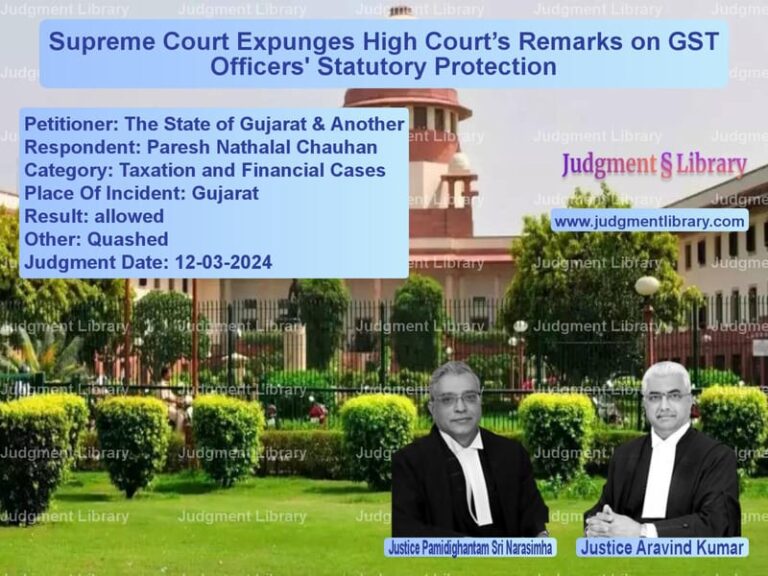Supreme Court Modifies Conviction in Uttar Pradesh Murder Case
The case of The State of Uttar Pradesh vs. Subhash @ Pappu revolved around a murder that occurred in 1980 in Firozabad, Uttar Pradesh. The Supreme Court had to determine whether the accused, Subhash @ Pappu, was rightly acquitted by the Allahabad High Court after being convicted by the trial court for murder under Section 302 of the Indian Penal Code (IPC). The Court modified the conviction and held him guilty under Section 304 Part I IPC instead of Section 302 IPC.
Background of the Case
The case stemmed from an incident on December 4, 1980, when the accused and others assaulted a shop servant, Bengali, after he refused to give them sugar and kerosene without a ration card. Bengali was injured and later succumbed to his injuries after 30 days of hospitalization. The trial court convicted the accused under Section 302 IPC and sentenced him to life imprisonment, but the High Court later acquitted him, leading the State to file an appeal in the Supreme Court.
Key developments in the case:
- December 4, 1980: The accused, along with others, attacked Bengali with a hockey stick and a knife.
- December 5, 1980: Bengali made a dying declaration identifying the accused.
- January 4, 1981: Bengali succumbed to his injuries due to septicemia.
- 1983: Charges were framed against the accused under Sections 148 and 302 IPC.
- 1985: The trial court convicted the accused under Section 302 IPC and sentenced him to life imprisonment.
- Allahabad High Court: The High Court acquitted the accused, citing contradictions in the evidence.
- April 1, 2022: The Supreme Court modified the conviction to Section 304 Part I IPC.
Petitioners’ Arguments
The State of Uttar Pradesh, represented by Senior Advocate Garima Prasad, argued:
“The High Court erred in acquitting the accused despite the dying declaration, which clearly identified the accused as part of an unlawful assembly that attacked the deceased.”
Key points raised:
- The dying declaration was recorded by an official magistrate and was consistent with the medical evidence.
- The accused was part of a group that assaulted the deceased, and he actively participated in the crime.
- The High Court overlooked the fact that six to seven people attacked Bengali, but only three were charge-sheeted.
- The High Court wrongly disregarded the dying declaration and the medical evidence.
Respondents’ Arguments
The accused, represented by Advocate Deepak Goel, countered:
“The contradictions in the FIR and the dying declaration cast serious doubts on the prosecution’s case, and the accused should not be convicted solely on the basis of a defective charge.”
Key counterarguments:
- The FIR stated that the accused inflicted a knife blow, while the dying declaration only mentioned a hockey stick assault.
- There was no explicit mention of who inflicted the fatal knife injury.
- The accused was not charged under Section 149 IPC, which relates to unlawful assembly.
- The weapon (hockey stick) allegedly used by the accused was never recovered.
Supreme Court’s Observations
The Supreme Court bench, comprising Justices M.R. Shah and B.V. Nagarathna, upheld the conviction but modified it from Section 302 IPC to Section 304 Part I IPC.
The Court stated:
“Even though the accused did not inflict the fatal knife injury, he was part of an unlawful assembly that committed the assault, and the common object of the assembly was to attack the deceased.”
Key findings:
- The dying declaration was consistent and reliable, even though the victim did not specify who stabbed him.
- The accused actively participated in the attack, which led to the victim’s death.
- The lack of specific charges under Section 149 IPC did not invalidate the conviction.
- The High Court had wrongly acquitted the accused despite overwhelming evidence.
Final Ruling
The Supreme Court modified the conviction and ruled:
- The accused is guilty under Section 304 Part I IPC instead of Section 302 IPC.
- The sentence is reduced to 10 years rigorous imprisonment with a fine of ₹5,000.
- For the offence under Section 148 IPC (rioting with a deadly weapon), the accused is sentenced to three years imprisonment.
- Both sentences will run concurrently.
Conclusion
This ruling underscores the Supreme Court’s approach to evaluating dying declarations and modifying convictions when required. The decision ensures that justice is served while also recognizing the principles of criminal liability and sentencing proportionality.
Petitioner Name: The State of Uttar Pradesh.Respondent Name: Subhash @ Pappu.Judgment By: Justice M.R. Shah, Justice B.V. Nagarathna.Place Of Incident: Firozabad, Uttar Pradesh.Judgment Date: 01-04-2022.
Don’t miss out on the full details! Download the complete judgment in PDF format below and gain valuable insights instantly!
Download Judgment: the-state-of-uttar-p-vs-subhash-@-pappu-supreme-court-of-india-judgment-dated-01-04-2022.pdf
Directly Download Judgment: Directly download this Judgment
See all petitions in Murder Cases
See all petitions in Attempt to Murder Cases
See all petitions in Judgment by Mukeshkumar Rasikbhai Shah
See all petitions in Judgment by B.V. Nagarathna
See all petitions in partially allowed
See all petitions in Modified
See all petitions in supreme court of India judgments April 2022
See all petitions in 2022 judgments
See all posts in Criminal Cases Category
See all allowed petitions in Criminal Cases Category
See all Dismissed petitions in Criminal Cases Category
See all partially allowed petitions in Criminal Cases Category







